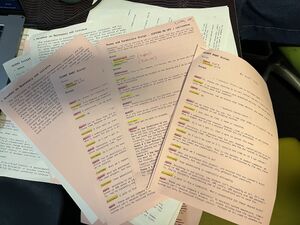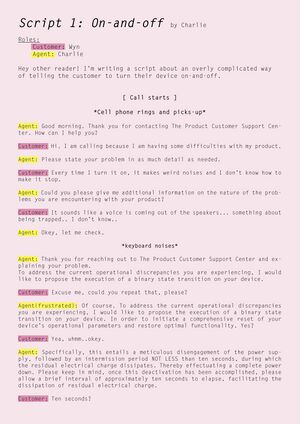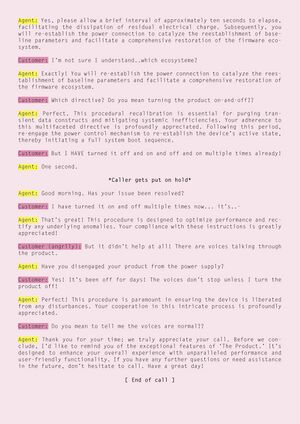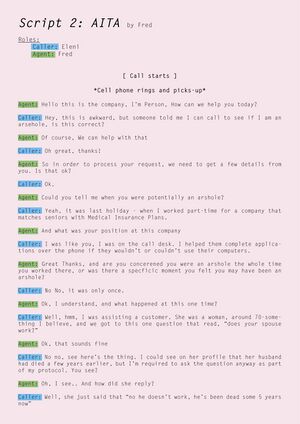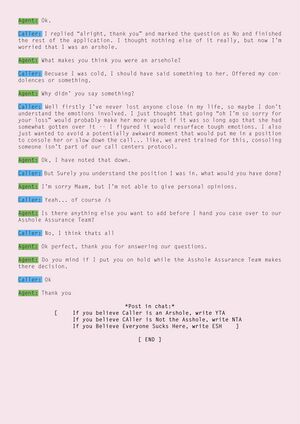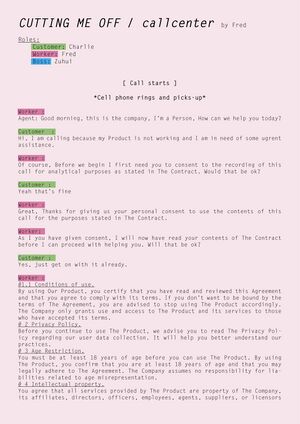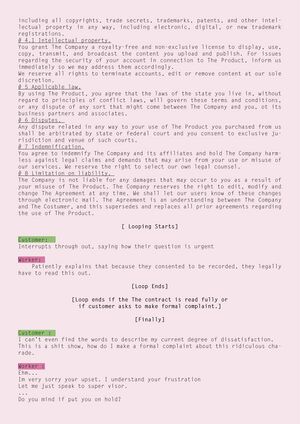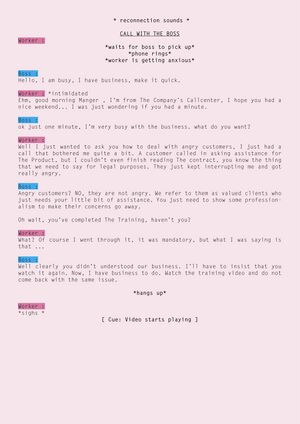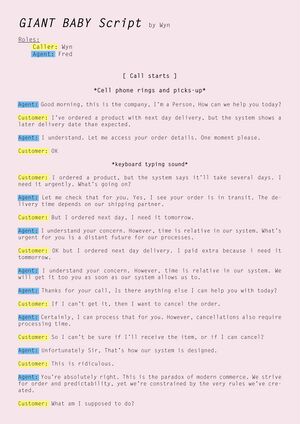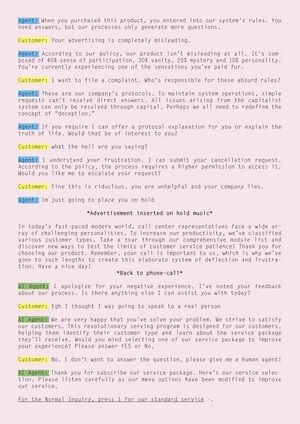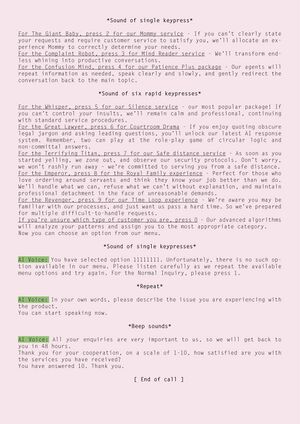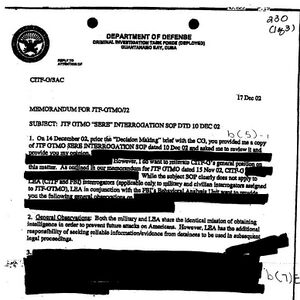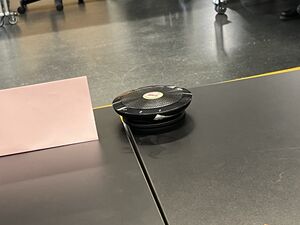SI25 Broadcast 5: Protocols For Bad Customer Service
Radio recording
Concept
For Radio show number 5, we setup a fictional call center, which refers to itself as The Company. The Company's main objective was to sell "the Experience of the Product!" In the segments/scripts, one host acts as a call center worker managing multiple calls, another as a supervisor for The Company, and others as callers seeking customer support. Contents, questions and discussions are as generic and non-specific as possible.
Roles
- Claudio(producer) /Charlie(interface)
- Wyn
- Zuhui
- Fred
- Eleni
In this week's radio performance, we use protocols —those rules and procedures commonly found in bureaucratic and corporate systems— as a central theme.
Setup
We used two laptops, one playing prerecorded scripts from the Wiki and another playing samples using Ableton, which also added a distortion effect to one of the microphones.
Structure
Pre-recorded intro script written and performed
About 10-15 mins of hold music.
...
A caller calls in.
Caller gets annoyed at worker and insults him.
The worker calls his supervisor for help "I will put you on hold".
The supervisor keeps the worker down and tells him to watch again the Training video.
A new caller calls in and she is greeted by an AI assistant.
...
Outro script
Prototype
This radio show tried to explore the power dynamics in call center systems through a series of role-play conversations. It inspired by Sound Jamming (VCV Rack!!), we had a role play in last show, and has different standpoints while our group member read the interview, leading us to rethink the relationship between language, identity, and system. The confusion and questions we encounter reflect the gaps between protocols and real human needs. The conversations, advertisements, and system responses emerge as layers of bureaucratic communication. During our group meeting, we were inspired by shared experiences with customer service. Since the theme of protocols was central to our discussion, we created a fictional call center to examine how language operates within systematic constraints. We wanted to explore how agents serve as mediators rather than power holders, caught between system limitations and customer needs.
Design
How can we reveal the power dynamics in automated systems? How do protocols shape human communication? How do we structure the tension between human needs and systematic responses? It reminds us of the concept of interpretative labor - agents must constantly interpret between rigid protocols and fluid human situations. The system transfers both problem-solving and emotional labor onto agents, who must absorb customer frustrations while lacking the agency to resolve systemic issues. We collected stories from Reddit and classic film scripts about call center experiences, creating four role-play scenarios that demonstrate this double bind, focusing primarily on the user's dilemma within the system.
Sound Techniques
A. Role-play Dialogue
- Character development
- Emotional progression
- System interruptions
B. Sound Elements
- TTS
- Lyric Jungle
- Hold music
- Phone call effect
C. Narrative Structure
- Multiple scenarios
- Advertising breaks
- System messages
D. Tension Building
- Growing frustration
- Protocol limitations
- Human-AI interaction
E. Phone System Elements
Automated messages, hold music, and system prompts that interrupt and shape human conversation.
F. Fake Advertisements
Inserted phone advertisements that highlight the human-AI relationship.
Scripts
We selected and adapted stories highlight the relationship between humans and automated systems. The dialogue serves as a backbone to explore how people are conditioned by machine expressions.
The system sounds create an institutional atmosphere, expressing the cold, automated environment of call centers.
Music and advertisements add ironic commentary on the commercialization of human interaction.
Script 5: Redaction protocol
“Secrecy is another by-product of administrative power.
‘Every bureaucracy seeks to increase the superiority of the professionally informed by keeping their knowledge and intentions secret’, wrote sociologist Max Weber.
Visual representations of ‘official secrets’—as Max Weber calls them—can be found in the form of redacted documents, both for legal, financial, or security purposes. A request for government documents can produce pages full of blacked-out lines, as if it was abstract art. The stupidity and irra- tionality of bureaucratic reasoning as someone within the adminis- tration painstakingly has to go over the text line by line, rendering information useless.” - CAPS LOCK, Ruben Pater
Protocol sheet
using the script of <CALL CENTER TRAINING: PROPER USE OF TONE OF VOICE & VOLUME>
Audio
Hold Music
United Airlines
Amazon
BestBuy
Fedex
Ikea
Samsung
Polycom
Best Hold Music Ever https://www.youtube.com/watch?v=5r98QdCRR68
Cisco Opus Number One (BADGRRL Rework) https://soundcloud.com/sparx_x_x/cisco-opus-number-one-badgrrl-rework
Hold (Opus number 1 Tribute) https://soundcloud.com/user-849824270-948673776/hold-opus-number-1-tribute
Dial and ringing
Dialing number - hectic
Dial tone
Dial and ringing
Call connecting
Ringing x 3
Ringing x 3
ringing 4min30
When you dial to fax machine instead of landline
Sound of dial-up internet
Dial up modem handshake
Number unavailable
Picking-up
Hanging-up
Voicemail beep
Censoring beeps
0.5sec
1sec
3sec
10sec
Telephone Ringtones & Sounds
Office phone
2010s house phone
Shrill ringtone
Vintage telephone
8bit ringtone
Telephone ringing in distance
Static
Signal Interference
Static noises
Radio static
Tuning radio static
Electrical static
Grainy static
WeeWooWeeWoo static
Weird military static and Jingle
Audio mix
Disturbances in connection
Disturbances in connection + Helphelphelp
Disturbances in connection + Helphelphelp + Hold Music
Intro: Pre-recorded operator message
1. "You’re calling, ‘The company’. Your call is very important to us, it will be answered soon. please wait on the line."
2. "Here at our business, we run the best business that you can possibly find. Nobody else does business quite like us. Thanks for holding"
3. "Are you a premium member of our business yet? If not, you should sign up for paid membership online. We know you don’t wanna do it, but we are going to keep reminding you that you should do it until you actually do. Thanks."
4. "We are currently transferring your call to the next representative. In the mean time, did you know, we won the best business award in 2017? We do our best to run the best business in the world and being best matters the most to us, the best."
5. "Our representative is almost ready to take your call. Just a few more moments while we complete some very, very important internal procedures that we can’t really explain. Thank you for holding."
6. "We’re currently experiencing higher than normal call volumes. But rest assured, you're in the system. Somewhere. You are now a part of something bigger. Please continue to hold."
7. "Did you know, that we only hire one or two telephone operators at a time? We want to make sure you listen to our hold music, cuz we paid a lot of money to license them. Hope you enjoy and thanks."
8. "We’re still here, making sure that you’re waiting. It’s what we do best. Hold on tight and enjoy our pleasant music. Our hold music was scientifically engineered to relax you. If you feel like it’s not, please give it another 10 minutes or so. Thank you for holding."
9. "Fun fact, the hold music you’re hearing right now was handpicked by our CEO during a vision quest in the mountains of Peru. We hope it brings you as much clarity as it brought him. Please continue to hold."
10. "Your call is in the queue, but don't worry—we've recently installed a system that may or may not prioritize your call based on your membership credits. Please hold and we appreciate your patience. In fact, patience is the key to all good things in life."
11. "You’re in line to speak with a representative. But what does it really mean to be 'in line'? Is it a straight path? Or a loop? Either way, we’ll get to you eventually. Please hold."
12. "We’re almost ready to assist you. Almost. ‘almost’ is a strange concept, isn’t it? Always just out of reach. Please continue to hold."
13. "Your call will be answered soon. But what does ‘soon’ really mean? Does anyone ever truly know? For now, just hold. Someone will be with you soon."
14."Did you know, that time is an illusion? Much like our customer service. … “So then.. If you awaken from this illusion, and you understand that black implies white, self implies other, life implies death — or shall I say, death implies life — you can feel yourself not as a stranger in the world, not as something here on probation, not as something that has arrived here by fluke, but you can begin to feel your own existence as absolutely fundamental.”"
Call center training
<CALL CENTER TRAINING: PROPER USE OF TONE OF VOICE & VOLUME>
All pre-recorded operator messages should be recorded following the instruction above.
David Graeber
“The experience of bureaucratic incompetence, confusion, and its ability to cause otherwise intelligent people to behave outright foolishly, opens up a series of questions about the nature of power or, more specifically, structural violence. The unique qualities of violence as a form of action means that human relations ultimately founded on violence create lopsided structures of the imagination, where the responsibility to do the interpretive labor required to allow the powerful to operate oblivious to much of what is going on around them, falls on the powerless, who thus tend to empathize with the powerful far more than the powerful do with them. The bureaucratic imposition of simple categorical schemes on the world is a way of managing the fundamental stupidity of such situations. In the hands of social theorists, such simplified schemas can be sources of insight; when enforced through structures of coercion, they tend to have precisely the opposite effect.”
Outro: Pre-recorded operator message







